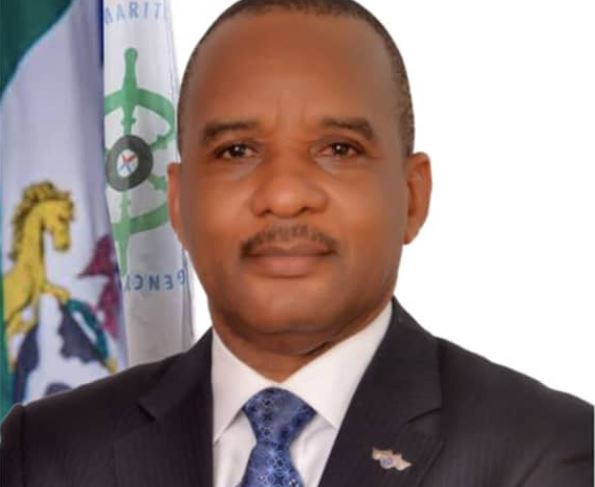
Last week, Dr Bashir Jamoh signed-off as the Director General of Nigerian Maritime Administration and Safety Agency (NIMASA), marking the end of his four years stint at the helm of affairs at the Grade ‘A’ agency. He handed over to one of the Executive Directors.
How can one forget that, Jamoh’s emergence as the CEO of NIMASA was the climax of intense politicking for the soul of the strategic federal agency? He schemed to get it, and he got. The story behind his emergence is a classic one, known to perhaps all discerning stakeholders.
Apart from the records of Mr Patrick Egesi as the DG of the then-National Maritime Authority (NMA), Dr Jamoh is the second ‘home-grown’ head of the agency, considering the fact that he rose to the position of Deputy Director, before being catapulted to the position of Executive Director of the agency; from where he eventually became the CEO.
Jamoh actually joined NIMASA as an Assistant Chief Commercial Officer. He had previously worked with the Kaduna state government, before transferring his services to the then-National Maritime Authority. So his ascendancy to the headship of NIMASA and the intrigues that heralded it came with a lot of expectations.
We will assess him and place him side by side the promises that he made while assuming office on March 10, 2020.
Shipping Position Daily embarks on this appraisal each year since he was appointed, because he requested for it. While marking his 100 days in office about four years ago, he had challenged the maritime media to be fair in reporting the sector. He had also specifically requested that the media should objectively appraise his performance. “If we do well tell the world, if we fail to perform tell us”, he tasked the maritime media.
That day; four years ago, he told the world that his administration was adopting a three ‘S’ strategy of: Security, Safety and Shipping Development, to rejig the agency to reclaim its status in the Nigerian economy.
How time flies! Even though Jamoh inherited a piracy scourge, the story has indeed changed. Prior to his appointment, Nigeria had recorded an unprecedented upsurge in piracy within her territorial waters and within the Gulf of Guinea where she is a dominant player. In 2020, when he was appointed, attacks on ships reached an unprecedented crescendo, as pirates brazenly operated. Nigeria was at that time described as piracy hotbed in the world.
The fact that Nigeria is no longer a piracy-prone nation was affirmed just last week by no other person than the head of Nigeria Navy.
The Chief of Naval Staff (CNS), Vice Admiral Emmanuel Ogalla says there has been no record of piracy on Nigerian territorial waters in the last two years.
Even though the Navy wanted to claim credit for this feat, it is well known locally and globally that the Deep Blue Project which NIMASA initiated and funded was largely responsible for the drop in piracy and sea robbery in Nigeria. The project involved acquisition of different categories of equipment for use in the fight against sea robbery, piracy and other maritime crimes.
The signing into law of the Suppression of Piracy and Other Related Maritime Crimes Offences Act, coupled with the launch of the Deep Blue Project led to significant reduction in piracy and kidnappings, arrests and successful prosecution of criminals
It is a known fact that a viable indigenous fleet will enhance the nation’s participation in shipping. This is what informed the enactment of the Cabotage Act, which also embedded the Cabotage Vessel Finance Fund (CVFF).
Disbursing this fund has been a difficult issue with successive administrations of NIMASA. It is on record that even though Jamoh secured presidential approval, he could not deliver on the promise to disburse the Fund.
He did not go beyond selecting the Primary Lending Institutions (PLIS). Maritime industry stakeholders will hold him accountable to his failed promise of disbursing the funds.
Another sore area in the four years’ tenure of the erstwhile DG is the Nigerian Seafarers Development Programme (NSDP).
Yes, it is on record that more than 2,000 young Nigerians have benefited from this project, which is aimed at growing a new generation of skills in Marine Engineering, Nautical Science and Naval Architecture. But, in the four years of Jamoh, the NSDP witnessed scandals upon scandals. It is either the cadets were not paid their allowances or those who had finished their programmes could not secure spaces on ships for their mandatory seatime.
Apart from the issues highlighted above, perhaps, one of the greatest test of Jamoh’s service at NIMASA is the current fate of the multi-million Naira floating dock.
Dr Jamoh had in 2020, promised that the craft would be moved to NPA shipyard in Apapa from where it would be put to use by employing about 350 staff and generating revenue into the coffers of government.
He had said: “Apart from the N1 billion naira monthly that the floating dock will generate, we are expecting up to 350 staff engagement and these are the main workers.
The fact is that between 2020 and last week when he was removed, nothing commendable happened to the ill-fated craft, beyond being moved here and there and being subjected to depreciation.
While we will not score Jamoh high, we will also not rate him as a failure. But he scored below average.
Shi owners see him as perhaps the worst DG, since according to them, he did nothing to aid shipping development and issues associated with it. Here, they list CVFF, NSDP, Cabotage and indigenous shipping, certification and employment of seafarer, as areas where he could have impacted, but he did not. And we agree with them.















